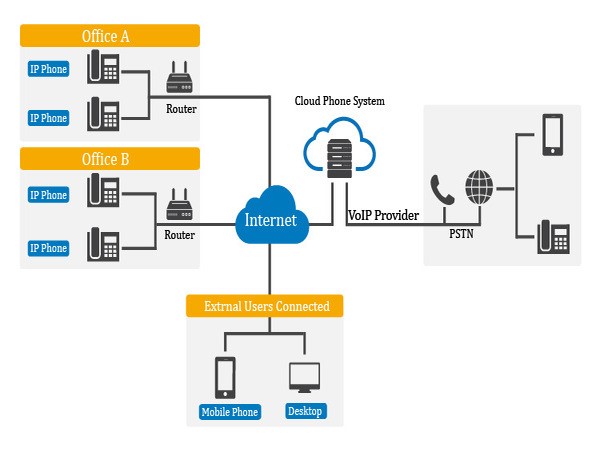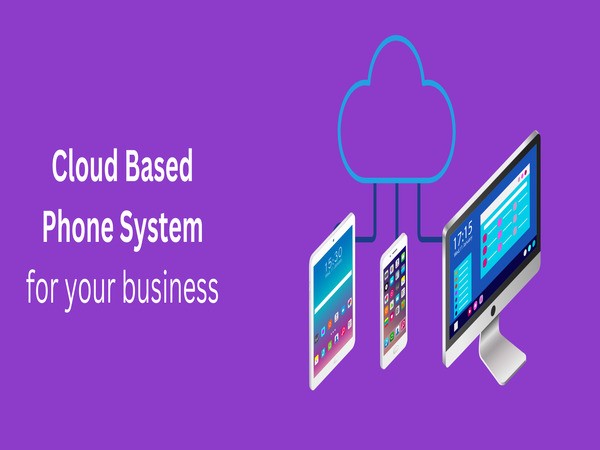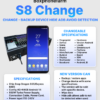In today’s fast-paced digital era, using smart solutions to optimize business operations has become more necessary than ever. A Cloud Phone System not only simplifies communication management but also brings high flexibility and efficiency. So, what is a Cloud Phone System, how does it work, and what specific benefits does it bring to businesses? Let’s explore with Genfarmer in this article.
What is a Cloud Phone System?
In today’s technological age, the use of modern communication solutions like a Cloud Phone System is becoming increasingly popular. But what is a Cloud Phone System? This section will define what a Cloud Phone System is and introduce its operational features to help you better understand this optimal solution.
Definition of a Cloud Phone System

A Cloud Phone System is a communication solution that uses cloud technology to connect and manage phone calls, instead of using traditional systems based on hardware and physical infrastructure. Calls are processed over the internet and stored on cloud servers, which helps minimize investment costs in hardware equipment as well as system maintenance costs. A Cloud Phone System offers flexibility, easy scalability, and integration with other support tools like CRM, email, and business software, providing an effective communication experience for both small and large businesses.
Operational Features of a Cloud Phone System

A Cloud Phone System, also known as a Cloud PBX, is a modern telecommunications solution based on a cloud platform that helps businesses optimize internal and customer communication. Here are the outstanding operational features of this system:
- Cloud-Based Operation: Unlike traditional PBX systems that require bulky hardware, a Cloud Phone System operates over the internet. All system data and features are stored and managed on cloud servers, minimizing initial hardware investment and maintenance costs.
- Flexible Scalability: This system allows businesses to easily expand or reduce their scale according to their needs. Adding more users, installing additional features, or expanding the connection area can be done with just a few clicks on the management interface, without changing the hardware structure.
- Integration of Diverse Smart Features: A Cloud Phone System offers many modern features such as:
- IVR (Interactive Voice Response): An automated response system that guides customers quickly and professionally.
- Call Forwarding: Forwards calls to other numbers when the recipient is unavailable.
- Voicemail: Records messages when calls cannot be answered.
- Call Analytics: Provides detailed reports on the number, duration, and quality of calls.
- Stable and Highly Secure Operation: A Cloud Phone System uses modern data centers with multi-layered security. This ensures that calls and communication data are transmitted securely and stably. In addition, the system integrates security measures such as data encryption and DDoS attack protection.
- Remote Work Capability: A major advantage of a Cloud Phone System is its support for remote work. Employees only need an internet-connected device (such as a mobile phone, laptop, or tablet) to make and receive calls from anywhere, ensuring uninterrupted communication.
- Optimized Costs: By eliminating the need for large hardware investments and minimizing maintenance costs, a Cloud Phone System helps businesses save significantly. Moreover, service packages are often charged based on actual usage, allowing businesses to control their budgets effectively.
- Automatic Updates and Maintenance: The system is continuously updated by the service provider without requiring business intervention. This ensures that the system always operates with the latest version, featuring high functionality and security.
With the outstanding features mentioned above, this system not only enhances operational efficiency but also helps businesses adapt quickly to the digital transformation trend in the 4.0 era.
Outstanding Features of a Cloud Phone System

A Cloud Phone System not only replaces traditional PBXs but also brings many advanced features, helping businesses optimize work efficiency and enhance customer experience. Here are the outstanding features of a Cloud Phone System.
Flexible Use Anytime, Anywhere
One of the most important features of a Cloud Phone System is the ability to operate anytime, anywhere, as long as the device has an internet connection. Employees can make and receive calls via mobile phones, tablets, or personal computers, whether they are working in the office, at home, or on a business trip. This is particularly useful in remote work environments or when a business has multiple branches.
IVR (Interactive Voice Response)
The Interactive Voice Response (IVR) system automatically greets and guides customers through keypad presses. For example: “Press 1 for customer care, press 2 for the technical department…” This feature not only saves time but also enhances professionalism in customer care.
Multi-Channel Communication Integration
A Cloud Phone System supports integration with various communication channels such as email, chat, or video calls. This feature allows businesses to manage all forms of communication on a single interface, thereby optimizing workflows and improving customer experience.
Voicemail and Call Recording
The system allows users to save voice messages or record the entire content of calls. This feature is very useful for storing important information, ensuring transparency, and supporting employee training.
Call Analytics
This feature provides detailed reports on the number of calls, duration, quality, and trends in the business’s communication. Managers can then evaluate team performance, improve customer care strategies, and optimize operational processes.
Integration with Management Software (CRM)
A Cloud Phone System easily connects with customer relationship management (CRM) systems like Salesforce, HubSpot, or Zoho. When a customer calls, the system will immediately display detailed information such as transaction history, helping employees provide faster and more effective support.
Benefits of a Cloud Phone System for Businesses

A Cloud Phone System has become an indispensable telecommunications solution in the digital transformation era. This system brings many outstanding benefits, helping businesses improve operational efficiency, save costs, and enhance customer experience.
Saving on Investment and Operational Costs
Traditional PBX systems require businesses to make large investments in hardware, infrastructure, and maintenance costs. In contrast, a Cloud Phone System operates on a cloud platform, eliminating the need for complex hardware. Businesses only need to pay a monthly service fee or based on actual usage, thereby significantly saving on initial investment and reducing operational costs.
Enhancing Remote Work Capability
With a Cloud Phone System, employees can work from anywhere with just an internet-connected device such as a mobile phone, tablet, or laptop. This is particularly useful in remote work situations or when a business has a distributed workforce across multiple locations. The system ensures stable and seamless communication, helping to maintain work efficiency even when not in the office.
Improving Customer Experience
The system integrates modern features such as IVR (Interactive Voice Response), smart call routing, and voicemail, which help improve the customer experience. Calls are handled quickly, directed to the right person or department, reducing wait times and increasing customer satisfaction.
Improving Work Performance
Features like call recording, call analytics, and integration with CRM software help businesses manage customer information more effectively. Employees can easily track transaction history, store important information, and optimize workflows, thereby improving the overall work performance of the team.
Securing Communication Information
A Cloud Phone System uses advanced security measures such as data encryption, multi-factor authentication (MFA), and DDoS attack protection to ensure maximum security for business communication. This helps minimize the risk of information leaks while ensuring compliance with international security standards.
Steps to Implement a Cloud Phone System for a Business

Implementing a Cloud Phone System for a business requires careful preparation and execution of specific steps to ensure the system operates effectively, meeting communication and management needs. Here is a detailed guide on the steps to implement a Cloud Phone System for a business.
Assess Needs and Define Objectives
First, the business needs to clearly assess its internal and customer communication needs. This includes determining the number of users, the number of calls per day, and necessary features such as IVR, voicemail, or call recording. At the same time, the business needs to set specific objectives, such as optimizing communication costs, improving remote work efficiency, or enhancing customer experience.
Choose a Suitable Service Provider
The business should compare providers based on factors such as features, scalability, service costs, and the quality of technical support. A reliable provider will ensure the system operates stably, is highly secure, and has the ability to integrate with other management tools like CRM or internal management software.
Develop a Detailed Implementation Plan
After selecting a provider, the business needs to develop a specific implementation plan. This plan includes analyzing the network infrastructure, identifying technical requirements, selecting appropriate equipment, and scheduling the implementation. In particular, the business needs to ensure that the implementation process does not disrupt current business operations.
Prepare Network Infrastructure and Equipment
For a Cloud Phone System to operate effectively, the network infrastructure and end-user devices need to be carefully prepared. The business needs to ensure that the internet speed is strong and stable enough to handle VoIP calls. In addition, devices such as IP phones, headsets, or softphone applications on computers also need to be checked and fully installed.
Configure the System and Integrate Software
In this step, the service provider will assist the business in configuring the Cloud Phone System. User accounts are set up, and features such as IVR, voicemail, and call routing are configured according to the business’s specific needs. At the same time, the system can be integrated with management software like CRM, helping to synchronize data and optimize workflows.
Train Employees to Use the System
Employees need to be guided on how to make and receive calls, use voicemail, forward calls, and utilize advanced features like call recording or call data analysis. Thorough training will help employees become familiar with the system and use it effectively in their daily work.
Test and Run a Pilot
Before officially launching the system, the business needs to conduct tests and run a pilot. Test calls will be made to check sound quality, connection stability, and the functionality of the configured features. If any errors arise, they need to be fixed immediately to ensure the system operates smoothly upon official deployment.
Official Deployment and Monitoring
After successful testing, the system will be officially deployed. The business needs to monitor the system’s operation in the initial phase to ensure everything runs as expected. At the same time, tracking usage performance and analyzing call data will help the business identify and improve issues, optimizing the system for future usage needs.
Considerations When Deciding to Implement a Cloud Phone System

A Cloud Phone System has become a modern communication solution chosen by many businesses due to the benefits it offers. However, to ensure successful implementation and optimal value, businesses need to consider several important factors. Here are the points to consider when deciding to implement this system.
System Scalability and Flexibility
Businesses need to ensure that the system can meet future growth needs. This includes the ability to easily add new users, update or upgrade features without changing the system’s structure. In addition, the system needs to support working on various devices such as IP Phones, computers, or smartphones, helping employees work from anywhere, at any time.
System Security and Stability
Businesses should choose a solution with high-security features such as data encryption, call information protection, and defense against cyber attacks. At the same time, the system must ensure stable operation, without interruption during use, especially when the business has to handle important calls or has a high volume of communication.
Ensuring Appropriate Network Infrastructure
A Cloud Phone System is highly dependent on an internet connection, so preparing the appropriate network infrastructure is essential. Internet bandwidth needs to be strong and stable enough for VoIP calls. If possible, investing in a high-quality local area network (LAN) and configuring QoS (Quality of Service) is recommended to optimize sound quality and minimize interruptions.
Choosing a Reliable Service Provider
You should choose reputable providers with experience and good technical support. In addition, it is necessary to review the contract terms to ensure flexibility in case you want to change services or upgrade the system. A good provider will ensure the system operates stably and meets all the business’s needs.
Considering Integration with Current Tools
To optimize work efficiency, the Cloud Phone System needs to be well-integrated with the business’s current management tools, such as CRM, ERP, or customer care platforms. This integration helps synchronize data, enhance management capabilities, and improve the customer experience.
So, which businesses is a Cloud Phone System suitable for?

In the digital age, using cloud technology solutions to optimize business operations is becoming increasingly important. A Cloud Phone System, or a cloud-based phone system, is one of the powerful tools that help businesses improve communication efficiency and reduce costs. So, what types of businesses is this system suitable for?
Small and Medium-Sized Enterprises
Small and medium-sized enterprises (SMEs) are the most suitable group for a Cloud Phone System. Characterized by limited budgets and the need for flexible solutions, a Cloud Phone System offers many notable benefits. These businesses do not need to invest in expensive hardware or maintain a dedicated IT team, but only need to pay a monthly subscription fee for the service. Besides, the system is easy to deploy and use, helping businesses save time and costs.
Businesses with Remote Workforces
A Cloud Phone System is also an ideal solution for businesses with remote workforces, distributed offices, or the need to connect employees at multiple locations. Employees can use the system from anywhere, as long as they have an internet connection. This helps businesses maintain work efficiency, ensuring internal and customer calls are always conducted smoothly without reducing service quality.
E-commerce and Customer Care Businesses
E-commerce businesses and companies in the customer care sector will find many benefits from implementing a Cloud Phone System. These businesses have a frequent need to communicate with customers and partners through various channels, from phone and email to online chat. A cloud-based phone system helps integrate and manage multiple communication channels simultaneously, ensuring all customer requests are handled quickly and efficiently. In particular, a Cloud Phone System can also integrate with customer relationship management (CRM) systems, helping to record transaction history and important contact information, thereby improving service quality and customer experience.
Conclusion
With its flexibility, cost savings, and scalability, this system promises to be an ideal solution for all businesses in the digital transformation era. If you are looking for a new approach to optimize operations, a Cloud Phone System is definitely an option not to be missed.











